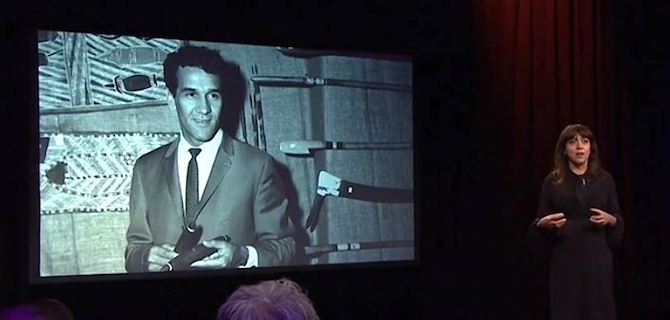Seeking equality as Indigenous distrust of government peaks
16 November 2019
Rachel Perkins yesterday delivering the first of her three Boyer Lectures, with an image of her father, Charlie Perkins. The lecture will be re-broadcast on Radio National Big Ideas today.
By MARK J SMITH
The 2019 Boyer Lecture series “The End of Silence” delivered by Rachel Perkins has injected new momentum into the call for a First Nations Voice to Parliament at a time when distrust of governments by Aboriginal people has reached its modern-day zenith.
It has been more than 50 years since anthropologist Bill Stanner coined the term “The Great Australian Silence” in 1968 when he proposed that Australian history had been wiped clean of its Indigenous past during his Boyer Lecture.
“Indigenous aspirations have not changed. They have been consistent across four decades,” Ms Perkins reminds us.
Across her three lectures Rachel Perkins emphasises hope and positivity for achieving constitutional recognition and a voice to Parliament, balanced with a measured analysis of the history that has brought Australia to this point.
“Indigenous people insist, and are determined to be hopeful. As am I,” she said.
“This is the fuel that fires the Uluru Statement from the Heart. It is hope.
“We can strive to see each other better. It is a catalyst. And if we make the best of it – it will give an opportunity to have a more wholistic view of our country’s identity and our narrative,” Ms Perkins said.
She set the context in the first lecture. Australia is on the eve of the 250th anniversary of James Cook’s first landing at Botany Bay in 1770 and Perkins proposes this is a perfect time for an attempt to reignite dialogue with wider Australia.
Perkins’ approach is engaging. She offers her insights not as an academic or an expert, but as an informed and concerned Australian.
“I am no expert. I am standing here doing the Boyer lecture, but I am not an expert at this. I am a film maker.
“I am not an Aboriginal elder. Quite yet.
“I am not a politician. Thank goodness.
“And I am not a lawyer.
“I am just an Australian,” she says.
It is a refreshing approach.
Ms Perkins says action on the Uluru Statement from the Heart will end Australia’s “cult of forgetfulness” when it comes to Aboriginal sovereignty.
“The Uluru Statement from the Heart gives us the road map to finally end the great Australian silence.
“I ask that you join me, for if there is something that we at Uluru share with our fellow Australians, it is a love for our country, our land and sea that binds us together and makes our future inseparable.”
What might success look like in the short term?
For Perkins it will be to reach out to those who might disagree with her position.
“I take you back to the past not to dwell on disappointment or be cynical about anniversaries and opportunities missed, but to demonstrate how Indigenous aspirations have been consistent, and that, despite all this disappointment, there is a determination to remain hopeful.”
Given the events of the last week at Yuendumu, as reported in the Alice Springs News and across the nation, the Boyer lectures are being broadcast at a time when distrust of governments by Aboriginal people has reached its modern-day height.
As the lectures are planned months in advance this is by coincidence rather than by design, but nevertheless highlights the need for healing.
It is time for Australia to end the imitation of democracy that excludes Indigenous Australians from the constitution and muffles their voices to Canberra.
Mark J Smith is the grandson of Father Percy Smith (1903-82) who was the first resident Anglican priest based in Alice Springs from 1933 and with his wife Isabel founded St Francis’ House, a home for Aboriginal children. Mr Smith holds an honours degree in history and politics from the University of Adelaide.




The cited “limitation of democracy” and “muffled voices” was ended when Neville Bonner was appointed To the Senate in 1971.
Consider his election in his own right by popular vote in 1972, 1974, 1975 and 1980.
Since Neville Bonner broke the ice, others have been elected.
Australians support equality of legal rights and legal responsibilities as Australians.
Australian voters’ silence is towards in-equality.
The Uluru Statement promotes in-equality, not equality.
Seems timely that Perkins is presenting the Boyer Lectures.
This shows how long Rachel Perkins has been campaigning for this. Does anyone remember the Boyer Lectures of 2019 – before the pandemic?
“I take you back to the past not to dwell on disappointment or be cynical about anniversaries and opportunities missed, but to demonstrate how Indigenous aspirations have been consistent, and that, despite all this disappointment, there is a determination to remain hopeful.”